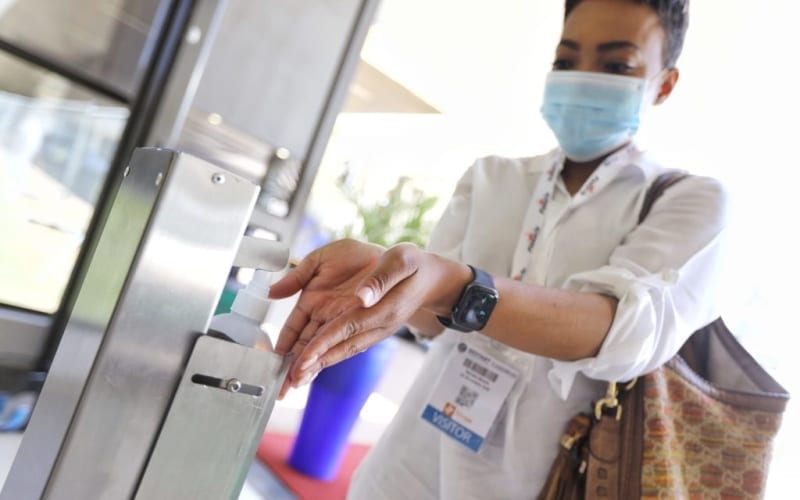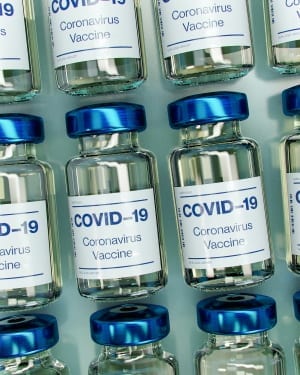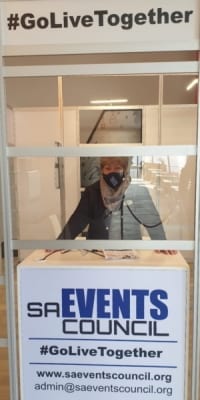One upside to the pandemic dragging on is that we know more about the novel coronavirus disease known as Covid-19 or SARS-CoV-2, and how to better respond to it. We can also patch together this information and start to see what the future of our industry could look like.
What do we know?
Firstly, it is probably not going away
With recurring waves of Covid-19, it seems unlikely that the virus will simply run its course and quietly disappear. Nature.com asked more than 100 immunologists, infectious-disease researchers and virologists working on the coronavirus whether it could be eradicated, and 89% believe it is likely or very likely to become an endemic disease (one which, like the flu, will become a disease we simply have to live with).
The good news – and yes, there is good news! – is that it is also likely that as an endemic disease it will become less dangerous over time. This happens as populations gain immunity, which slows its spread.
Of 100 immunologists polled, 89%believe it is likely or very likely Covid-19 will become an endemic disease.
The flu is a good example of such a scenario. The 1918 ‘Spanish flu’ pandemic killed more than 50 million people. Nowadays it is a disease most of us catch without deadly consequences, but which still claims roughly 650 000 lives per year.
Dr. Mukhlid Yousif, Senior Medical Scientist at the Centre for Vaccines and Immunology, National Institute for Communicable Diseases (NICD), explains, “For SARS-CoV-2, at the individual level, immunity is only partial, as we know that some individuals can get Covid-19 twice, but at the population level the disease is likely to transmit much more slowly once most people have some level of immunity to the virus. Thus, when most people have immunity to SARS-CoV2, either from natural infection or vaccination, the disease will spread much slower and not cause large outbreaks.”
READ: Vaccination salvation?
It’s also important to keep in mind that, while unlikely, if vaccinated people become infected with the virus, they can expect a reduced likelihood of severe Covid disease or death, adds Dr Yousif.
Secondly, despite vaccinations, preventative measures need to remain in place – at least for now
Even when people are vaccinated, the standard health and safety practices to prevent the spread of the disease should still be enforced. Dr. Yousif explains this in terms of the formula for calculating herd immunity, which is 1-(1/R0). The important measure here is the R0, which is how fast the virus transmits. The R0 of SARS-CoV-2 has been estimated as close to 3, which means on average one infected person infects 3 other non-immune people. The formula therefore works out that we need two thirds (67%) of our population (roughly 40 million people) to have immunity against the disease to achieve herd, or population, immunity.
“All the non-pharmaceutical interventions that are currently in place will have to be remain in place.”
However, the number 3 is achieved in the context of the health and safety measures we are currently practicing. Dr. Yousif says, “The reproductive rate (R0) of the virus depends on how much people mix, whether they wear masks and observe social distancing and handwashing. If people stop these interventions, then the R0 of the virus will increase, for example to 4 or 5, which means that the herd immunity threshold required to stop the virus would go up from 67% to 75 or 80%, meaning a higher proportion of the population would require immunity in order to slow the spread of the virus.”
READ: SA’s MICE sector: A SWOT analysis
As a result, he says that “all the non-pharmaceutical interventions that are currently in place will have to be remain in place.” This means we need to make sure we understand how to implement our industry’s Re-opening Guidelines effectively, at least for now.
What does this mean for the events industry?
Keep on keeping on, and innovating
Carol Weaving, MD of Reed Exhibitions South Africa, says, “Although, the vaccines are a massive step in the right direction, countries are prioritising healthcare workers and those at a high risk of contracting Covid-19 before vaccinating the general public. It could be months before our events’ target audiences will receive one. This means that in-person mass events and exhibitions may only start happening again in the last quarter of 2021 and organisers need to continue to be innovative with their offerings.”
“It could be months before our events’ target audiences will receive a vaccine.”
She adds, “Hybrid offerings are being embraced more than ever and it is vital that, as organisers, we educate our exhibitors and attendees on the benefits. The future of events and exhibitions will see a blended approach – taking the best of virtual and in-person.”
Another innovation that could help events reopen sooner is the development of health passports, such as Health Passport Worldwide. Justin Van Wyk, CEO of Big Concerts, spoke at AAXO’s ‘Exhibition and Events Industry Update: Hybrid Event’ on 25 March, and said that he and Health Passport South Africa have been in communication with Government about this technology.
Health Passport South Africa has a flagship Covid-19 testing centre at The Lookout at the V&A Waterfront in Cape Town which is demonstrating how testing can be used at scale – and which was used at Recharge 2020, an event organized by Big Concerts. Health passports are being used by FIFA and for the Olympic Games in Japan later this year. Van Wyk adds, “Government is well aware of it and interested in it as a solution to help our sector reopen safely.”
READ: Could this be the ticket to reopening events?
One concern with testing is the cost, especially on top of other Covid-19 health and safety costs. Rapid antigen tests usually cost several hundred Rands (Health Passport South Africa charges R350). Van Wyk believes a funding mechanism should be put in place that splits this price tag between event organisers, sponsors, attendees and Government. All of these stakeholders stand to benefit from events going ahead, and sharing the cost makes it a fairer and more viable option.
“We are working with SASCOC in lobbying government to allow spectators and attendees to events in larger numbers than the current restrictions allow.”
Mike Lord, MD of Alliance Safety and Interim Chair of the Event Safety Council, says, “As a council and subject expert when it comes to health and safety in the events sector, we are working with SASCOC (South African Sports Confederation and Olympic Committee) and various national sports bodies such as SARU (South African Rugby Union), Cricket SA, GolfRSA, Cycling SA, etc. in lobbying government to allow spectators and attendees to events in larger numbers than the current restrictions allow. By government allowing negative rapid tests as a vehicle to allow this, especially in achieving 50% venue capacity in the coming months, we see live events and business events benefiting from this industry call.”
READ: Hot topic: Should we use health passports for event access?
Build trust and confidence
Another concern Weaving voices is the lack of confidence many have in the ability of events to be managed safely. She says, “We need to build back exhibitor and attendee confidence. We need to educate all event participants on what we are doing to ensure their safety at our events.”
Ellen Oosthuizen, Chairperson of the SA Events Council and the PCO Alliance Network, as well as Owner of Bebe’s Events & Promotions, agrees that building trust that events can be safely managed is key to the survival of our sector.
Negative messaging about “events as super-spreaders” and that “gatherings are dangerous” has eroded confidence.
She says, “We as an industry have carried out multiple proof of concept events in the past year, to demonstrate how well equipped we are to create safe environments for events. This includes SAACI’s conference in July, the PCO Alliance event for corporates in September, the Restart Expo in November, and the Recharge 2020 live music event in December. Unfortunately, there is still a hesitancy to trust us, which is why the SA Events Council has launched the #TrustUs campaign.”
She explains that negative messaging about “events as super-spreaders” and that “gatherings are dangerous” has eroded confidence amongst event industry practitioners, clients and audiences, and risks leaving a legacy of mistrust that could harm our sector even if, and when, Covid-19 is no longer a serious threat.
Unfortunately, South Africa’s Government has not helped in this regard, as it still fails to make any distinction between the different types of mass gatherings – from funerals to concerts, sporting events and conferences, it classes these varied formats as carrying an identical risk.
READ: SA Events Council urges: Trust us to reopen the events industry safely
“If we are ever to get back to business, we need to build trust in the ability of the events industry to present solutions and resume safely,” she adds. The SA Events Council’s #TrustUs campaign aims to do this, by sharing honest, transparent communication about what the events sector has done to develop rigorous health and safety protocols, and to be Covid-compliant. In many ways, these precautionary measures are of far higher standards than those that can be observed in other industries, because of the concerns around bringing large groups of people together.
“If we are ever to get back to business, we need to build trust in the ability of the events industry to present solutions and resume safely.”
Beyond getting behind this messaging, Projeni Pather, Chairperson of AAXO and MD of Exposure Marketing, also encourages event organisers to put on as many events as they can. While speaking at AAXO’s Industry Update event, she said, “By hosting events we can demonstrate how safe they are. Even if it is only for 50 people, or a hundred, over time this will build trust.”
Differentiating the different types of gatherings
Gill Gibbs, Chairperson of EXSA and CEO of bluCube International and CG GOC, believes it is vital that more is done to differentiate business events like exhibitions from mass gatherings. She says, “We require formal recognition as a stand-alone MICE Industry with our own code – per global standards and best practice – and not to be engulfed by any other sector or left ‘hanging in limbo’ without formal status. If we can achieve this and move away from the perception that exhibitions are mass gatherings / super spreaders, recovery will be aided.”
“We require formal recognition as a stand-alone MICE Industry with our own code – per global standards and best practice – and not to be engulfed by any other sector or left ‘hanging in limbo’ without formal status.”

Part of the challenge in achieving this has been the lack of a clear ‘home’ for the MICE sector in government’s structures. She says, “We fall under supposedly various sectors, from tourism to hospitality to now the creative industry under the Department of Sport, Arts & Culture (DSAC). The MICE Industry does not have its own sector and, therefore, we lack structure and recognition.”
Knock, knock, knocking on Government’s door
Gibbs adds, “We also require Government support and endorsement of our plight, especially with respect to financial institutions, financial services, landlords and the like.”
Fortunately, some progress is being made in this regard. Last month, DSAC appointed a Ministerial Advisory Team (MAT) who will advise the Minister, Nathi Mthethwa, on how to deal with the challenges of this sector during Covid-19. Sharif Baker, Chairperson of SACIA and TPSA, was one of the seven appointed members of this team. TPSA is a special working group within SACIA, and SACIA is represented on the SA Events Council.
While the engagement is in its early stages, Baker feels positive about the results this should yield.
Baker also spoke at AAXO’s Industry Update event where he outlined the key portfolios the MAT has been assigned to focus on in the short term. These are:
- Private and Corporate Sector Portfolio will seek donations and sponsorships from the private sector for financial and communications support.
- Retail and Transport Portfolio aims to find ways to help the currently unemployed members of our sector with hamper basket relief from retail chain stores, and to remain mobile via public busses.
- Wellness Portfolio will not only seek interventions for mental wellness support, but also for business wellness support.
- School Fees Portfolio is intended to find solutions to keep the sector practitioners’ children in school, despite situations where fees cannot be paid.
- Banking and Landlords Portfolio will engage with the financial sector to establish relief measures, such as payment holidays.
- COIDA & TERS is intended to assist in adjusting SIC codes as well as offsetting Letters of Good Standing that affect business procurement.
He adds that the Minister has been “incredibly hands-on” and has also assigned a “dedicated team member from within DSAC to work and liaise with each member of the MAT”. So, while the engagement is in its early stages, Baker feels positive about the results this should yield.
And then there is the legal option
Litigation has also been mentioned as a possible avenue for the events industry to pursue, to challenge Government on some of its legislation which allows full planes and taxis to operate, malls to remain open, markets to run, and so forth, while essentially forbidding the events industry from getting back to work. The expectation is that, like the cigarette and liquor industries, litigation could help our industry get the attention it deserves with the urgency it needs.
Litigation could help our industry get the attention it deserves with the urgency it needs.
Glenton de Kock, the CEO of SAACI, says, “We have considered this as an option, and it is still an option. However, should we decide to go this route, we have to be in it for the long run, as it is a big and costly commitment.”
We can all play a role
While the various industry bodies continue to push for the events industry to re-open as soon as possible, they also encourage individuals and companies to do what they can in their own capacity. Whether it be putting together a petition, staging a protest such as the #LightSAred movement last year, or organising a march – “Everyone has the right to get out there and take action. It doesn’t stop with the SA Events Council,” reminded Pather at the close of the AAXO event.
However, whatever you decide to do, please keep in mind that all actions should support the argument that the business events sector is a responsible one, and that people can #TrustUs.










